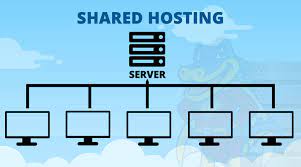
Table of Contents
Shared hosting typically offers a range of advanced features to cater to the diverse needs of website owners. Here are some advanced features commonly found in shared hosting environments:

Multiple Domain in Shared Hosting:
- It allows hosting multiple domains (addon domains) on the same hosting account. This enables users to manage multiple websites from a single hosting account, each with its own domain name and website content.
Subdomain Support:
- Subdomains allow users to create additional website addresses under their primary domain. Shared hosting plans typically support the creation of unlimited subdomains, providing flexibility for organizing and structuring website content.
Email Hosting:
- It includes email hosting features, such as customizable email addresses, webmail access, email forwarding, autoresponders, and spam filtering. Users can create and manage email accounts associated with their domain.
Database Support:
- Shared hosting plans usually include support for popular database management systems like MySQL or MariaDB. Users can create and manage databases for storing website data, such as content, user information, and application data.
Scripting Languages:
- Shared hosting supports a variety of scripting languages and frameworks, including PHP, Perl, Python, and Ruby on Rails. Users can develop dynamic and interactive websites using their preferred programming language.
Content Management Systems (CMS) Support:
- It is compatible with popular CMS platforms like WordPress, Joomla, Drupal, and Magento. Hosting providers often offer one-click installation tools or automatic CMS updates to simplify the deployment and management of CMS-based websites.
E-commerce Support:
- Shared hosting plans support e-commerce websites by providing features such as SSL/TLS encryption, secure payment gateways, shopping cart software, and e-commerce plugins or integrations.
Backup and Restore:
- It includes backup and restore capabilities for safeguarding website data. Users can create manual backups or schedule automated backups of website files, databases, and configuration settings. Backup retention policies and restoration options are typically available through the hosting control panel.
Security Features:
- Shared hosting plans offer various security features to protect websites from malware, hacking attempts, and other security threats. This may include firewalls, malware scanning, DDoS protection, IP blocking, and security updates for server software.
Control Panel Access:
- Shared hosting plans come with a web-based control panel (e.g., cPanel, Plesk) that allows users to manage their hosting account, domains, email accounts, databases, files, and security settings. The control panel provides an intuitive interface for performing administrative tasks and configuring advanced features.
Resource Allocation:
- Shared hosting plans allocate resources such as CPU, RAM, disk space, and bandwidth among multiple users on the same server. Advanced features may include resource usage monitoring, resource allocation controls, and scalability options for upgrading resources as needed.
Technical Support:
- Shared hosting plans typically include technical support from the hosting provider to assist users with setup, configuration, troubleshooting, and maintenance tasks. Advanced support options may include 24/7 live chat support, ticket-based support, and knowledge base resources.
These advanced features enhance the functionality and versatility of shared hosting environments, making them suitable for hosting a wide range of websites, from personal blogs and small business websites to e-commerce stores and web applications. Users can leverage these features to create and manage professional websites with ease while benefiting from the affordability and convenience.